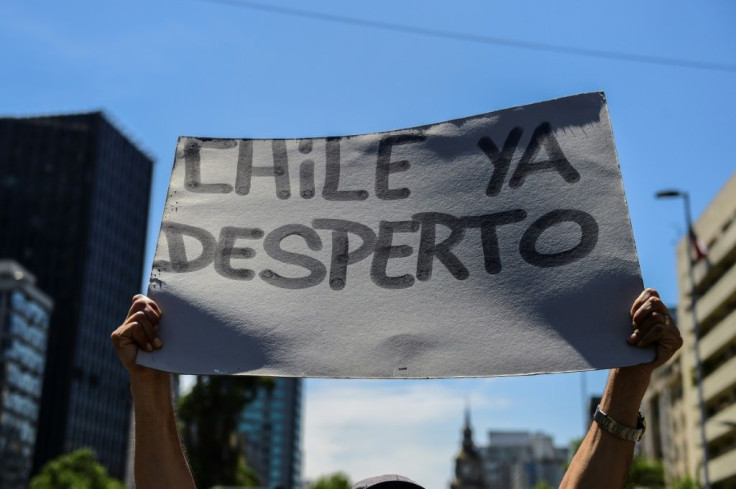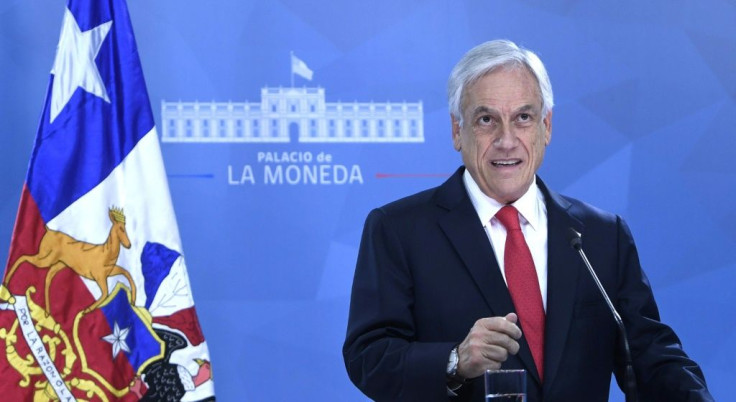UN To Probe Abuses In Chile As Strike Continues

The United Nations said Thursday it would send a special mission to investigate human rights abuses in Chile, where a general strike went into its second day following a week of street protests that left 19 dead.
President Sebastian Pinera tried to ease tensions by announcing a plan to end a highly unpopular state of emergency and nighttime curfews that have lasted six days.
"Having monitored the crisis in Chile since it began, I have decided to send a verification mission to examine the allegations of human rights violations," UN High Commissioner for Human Rights and former Chilean president Michelle Bachelet said in a tweet.
The protests erupted on Friday against a metro fare hike, but evolved into a wider rebellion over low salaries and pensions, high education and health care costs and a yawning gap between rich and poor.
While much of the action has been peaceful, metro stations were destroyed, supermarkets torched and looted, traffic lights and bus shelters smashed and countless street barricades erected and set alight.
Some 20,000 police and soldiers have been deployed in the city, using tear gas and water cannons to disperse demonstrators.
But they have also been responsible for five of the deaths, while social media has lit up with accusations of torture and abuse by the security forces.
"We're working on a plan to normalize life in our country... to end the curfew and hopefully to lift the state of emergency," Pinera said.

Authorities reported a reduction in violence on Wednesday compared with Tuesday, saying there had been no deaths, a 25 percent drop in arrests and fewer serious incidents.
The national human rights institute -- INDH -- says 584 people have been injured, 245 by firearms, and 2,410 detained.
Nine of the deaths came in fires started by looters.
'Increased polarization'
Chile's most powerful union, the Workers' United Center of Chile (CUT) continued industrial action that began on Wednesday.
"What President Pinera has done up until now is increase polarization and tension in the country," CUT president Barbara Figueroa told journalists.

"We have youngsters in the streets with a gun in their hands pointed at their own compatriots."
But in Santiago -- a city of seven million -- people seemed to be going to work as normal, with many shops and businesses opening their doors for the first time since the crisis erupted.
Soldiers guarded Santiago's metro stations on Thursday as three of the seven lines -- which usually carry three million people per-day -- were operating, backed up by 6,000 buses.
Almost all schools in the capital held classes, having mostly been closed earlier in the week. Even the capital's more combustible suburbs were calmer.
Focus and leadership lacking
The violence in Chile, usually one of the most stable countries in Latin America, is the worst experienced since returning to democracy after the 1973-1990 right-wing dictatorship led by General Augusto Pinochet.
But the protests lack a clear focus or recognizable leadership.
"This is the whole country's complaint. We're fed up," shouted one demonstrator over the din of pots and pans being banged in front of soldiers in Santiago.
In an address to the nation late on Tuesday, Pinera apologized for failing to anticipate the outbreak of social unrest and announced a raft of measures aimed at placating demonstrators.
He promised to increase the universal basic pension and minimum wage, cut public sector salaries and cancel a recent hike in electricity bills.
Foreign Minister Teodoro Ribera told reporters next month's APEC trade summit would go ahead despite the protests.
US President Donald Trump and his Chinese counterpart Xi Jinping are among those expected to attend the November 16-17 meeting to discuss ending their trade war.
In Paraguay, South American football's governing body CONMEBOL said the November 23 final of the Copa Libertadores -- the continent's equivalent of Europe's Champions League -- between champions River Plate of Argentina and Brazilian giants Flamengo would take place as planned in Santiago.
Ribera also said the capital would still host December's climate change conference Cop 25.
© Copyright AFP 2024. All rights reserved.





















